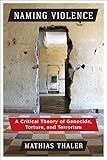Naming violence : a critical theory of genocide, torture, and terrorism / Mathias Thaler, Monographie imprimée
Language: anglais.Country: EtatsUnis.Publication : New York : Columbia University Press, copyright 2018Description: 1 vol. (X-236 p.) ; 24 cmISBN: 978-0-231-18814-2; 0-231-18814-5.Series: New directions in critical theoryDewey: 303.6, 23Abstract: In Naming Violence, Mathias Thaler articulates a novel perspective on the study of violence that demonstrates why the imagination matters for political theory. His analysis of the politics of naming charts a middle ground between moralism and realism, arguing that political theory ought to question whether our existing vocabulary enables us to properly identify, understand, and respond to violence. He explores how narrative art, thought experiments, and historical events can challenge and enlarge our existing ways of thinking about violence. Through storytelling, hypothetical situations, and genealogies, the imagination can help us see when definitions of violence need to be revisited by shedding new light on prevalent norms and uncovering the contingent history of ostensibly self-evident beliefs. Naming Violence demonstrates the importance of political theory to debates about violence across a number of different disciplines from film studies to history. --.Bibliography: Bibliogr. p. [205]-228. Index.Subject - Topical Name: Violence politique Philosophie | Génocide Aspect politique | Torture Aspect politique | Terrorisme Aspect politique| Item type | Home library | Collection | Call number | Status | Date due | Barcode | Item holds |
|---|---|---|---|---|---|---|---|
| Prêt normal | Bibliothèque provisoire Bron Salle de lecture | Politique | 322.42 THA (Browse shelf (Opens below)) | Available | 0380336222 |
Bibliogr. p. [205]-228. Index
In Naming Violence, Mathias Thaler articulates a novel perspective on the study of violence that demonstrates why the imagination matters for political theory. His analysis of the politics of naming charts a middle ground between moralism and realism, arguing that political theory ought to question whether our existing vocabulary enables us to properly identify, understand, and respond to violence. He explores how narrative art, thought experiments, and historical events can challenge and enlarge our existing ways of thinking about violence. Through storytelling, hypothetical situations, and genealogies, the imagination can help us see when definitions of violence need to be revisited by shedding new light on prevalent norms and uncovering the contingent history of ostensibly self-evident beliefs. Naming Violence demonstrates the importance of political theory to debates about violence across a number of different disciplines from film studies to history. --
P. 1 1, Political theory between moralism and realism P. 45 2, Telling stories : on art's role in dispelling genocide blindness P. 85 3, How to do things with hypotheticals : assessing thought experiments about torture P. 117 4, Genealogy as critique : problematizing definitions of terrorism P. 157 5, The conceptual tapestry of political violence


